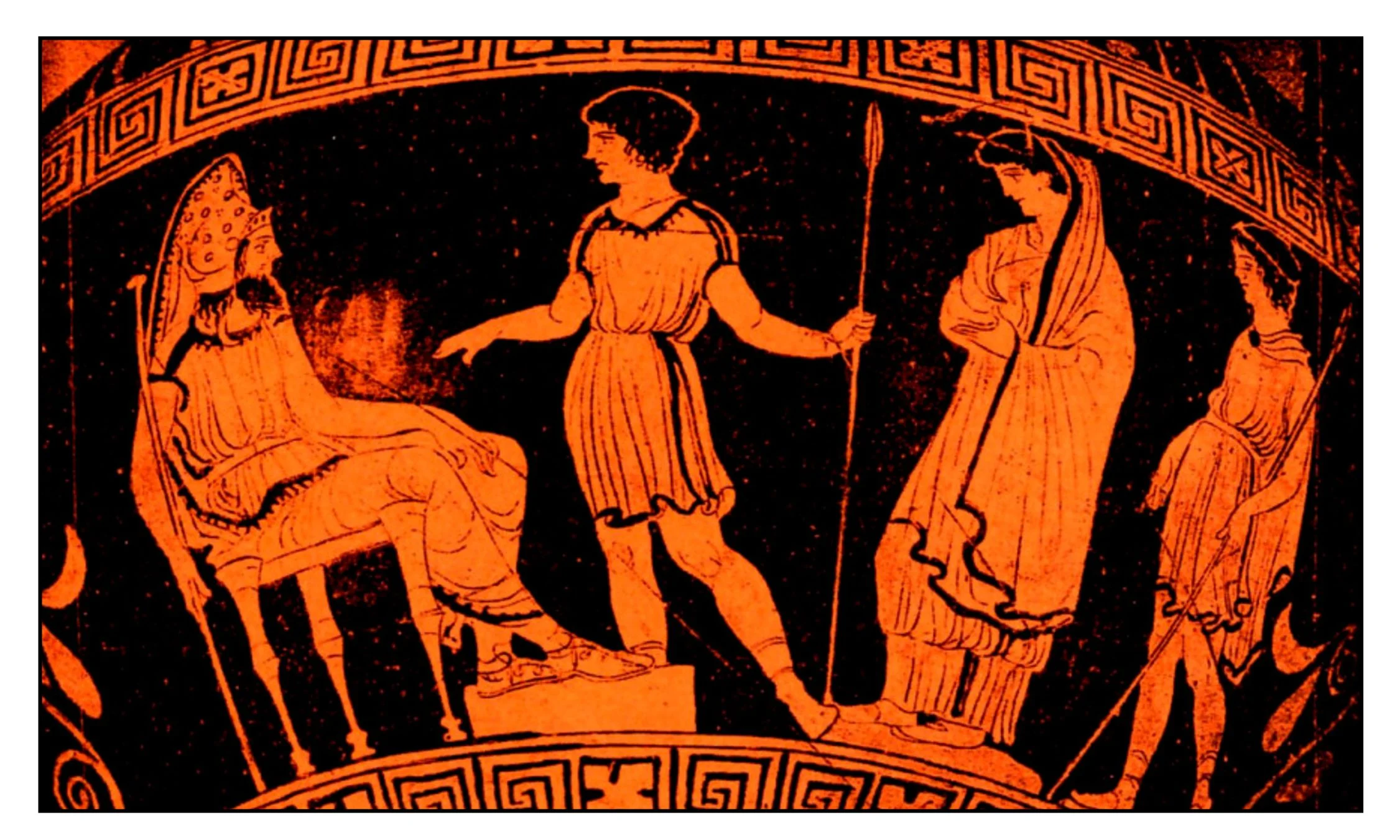Texts & Ideas: Antiquity and The Renaissance - Final
1/113
There's no tags or description
Looks like no tags are added yet.
Name | Mastery | Learn | Test | Matching | Spaced |
|---|
No study sessions yet.
114 Terms
They eat and drink from earthenware or glass, which make an agreeable appearance though they be of little value; while their chamber-pots and close-stools are made of gold and silver; and this not only in their public halls, but in their private houses. Of the same metals they also make chains and fetters for their slaves; on some of whom, as a badge of infamy, they hang an ear-ring of gold, and make others wear a chain or a coronet of the same metal. And thus they take care, by all possible means, to render gold and silver of no esteem.
from Thomas Moore’s Utopia; citizens have no practical use for precious metals unless they need to trade with foreign nations, they devalue gold/silver so wealth is not worshipped
Hang, cur! hang,
you whoreson,
insolent noisemaker!
We are less afraid to
be drowned than
thou art.
…
I'll warrant him for
drowning; though
the ship were
no stronger than a
nutshell and as
leaky as an
unstanched wench.
Antonio and Gonzalo curse a boatswain in The Tempest; reflects the noblemen’s disdain for lower class people, similar power imbalance between Prospero/Caliban
[He] brought the rude and uncivilized inhabitants into such a good government, and to that measure of politeness, that they now far excel all the rest of mankind. Having soon subdued them, he designed to separate them from the continent, and to bring the sea quite round them. To accomplish this he ordered a deep channel to be dug, fifteen miles long; and that the natives might not think he treated them like slaves, he not only forced the inhabitants, but also his own soldiers, to labor in carrying it on.
from Thomas More’s Utopia; themes of colonization, detachment, and shared labor
That time of year thou mayst in me behold
When yellow leaves, or none, or few, do hang
Upon those boughs which shake against the cold,
Bare ruin’d choirs, where late the sweet birds sang
Shakespeare’s “Sonnet 73”: the inevitability of death makes love all the stronger, autumn as an extended metaphor for growing older
I shall not determine whether this proceeded from any secret inspiration of God, or whether it was because it seemed so favorable to that community of Goods, which is an opinion so particular, as well as so dear to them; since they perceived that Christ and his Followers lived by that Rule; and that it was still kept up in some Communities among the sincerest sort of Christians, from which soever of these Motives it might be true it is, that many of them came over to our Religion, and were initiated into it by Baptism.
from Thomas More’s Utopia
So we grow together,
Like to a double cherry, seeming parted,
But yet an union in partition;
Two lovely berries moulded on one stem;
So, with two seeming bodies, but one heart
Helena says to Hermia for letting men rip apart their long friendship; (Helena thinks she is being mocked when suddenly Lysander and Demetrius love her)
You taught me language; and my profit on’t
Is, I know how to curse. The red plague rid you
For learning me your language!
Caliban refuses the colonizatio imposed on him by using the tools they have given him, language, to resist their influence by transgressing societal rules and cursing at them
Henry VIII., …having some differences of no small consequence with Charles the most serene Prince of Castile, sent me into Flanders, as his ambassador, for treating and composing matters between them.
One day, as I was returning home from mass at St. Mary’s, which is the chief church, and the most frequented of any in Antwerp, I saw Peter Giles, by accident, talking with a stranger, who seemed past the flower of his age;
… his face was tanned, he had a long beard, and his cloak was hanging carelessly about him, so that, by his looks and habit, I concluded he was a seaman. “if you knew the man, for there is none alive that can give so copious an account of unknown nations and countries as he can do, which I know you very much desire.” He has not sailed as a seaman, but as a traveller, or rather a philosopher. This Raphael carries the name of Hythloday.
The provided text describes a scene from Sir Thomas More's Utopia, where the narrator, likely More himself, encounters Peter Giles, his friend, in Antwerp, after attending mass at St. Mary's. Giles is seen conversing with a stranger who appears older, likely a seaman, with a tanned face, long beard, and a carelessly draped cloak. This stranger is later identified as Raphael Hythloday, who will narrate the story of Utopia
Lovers and madmen have such seething brains,
Such shaping fantasies, that apprehend
More than cool reason ever comprehends.
The lunatic, the lover and the poet
Are of imagination all compact:
One sees more devils than vast hell can hold,
That is, the madman: the lover, all as frantic,
Sees Helen's beauty in a brow of Egypt:
The poet's eye, in fine frenzy rolling,
Doth glance from heaven to earth, from earth to heaven;
And as imagination bodies forth
The forms of things unknown, the poet's pen
Turns them to shapes and gives to airy nothing
A local habitation and a name.
said by Duke Theseus in A Midsummer Night’s Dream; lovers, poets and madmen are all governed by imagination and not logic
The island … is in the middle two hundred miles broad, and holds almost at the same breadth over a great part of it, but it grows narrower towards both ends. Its figure is not unlike a crescent. Between its horns the sea comes in eleven miles broad, and spreads itself into a great bay, which is environed with land to the compass of about five hundred miles, and is well secured from winds. In this bay there is no great current; the whole coast is, as it were, one continued harbor, which gives all that live in the island great convenience for mutual commerce
describes the island of Utopia, explaining how it remains isolated/self-sufficient; ideal geography as well as ideal society
I compare her to one of those raging rivers, which when in flood overflows the plains, sweeping away trees and buildings, bearing away the soil from place to place; everything flies before it, all yield to its violence, without being able in any way to withstand it; and yet, though its nature be such, it does not follow therefore that men, when the weather becomes fair, shall not make provision, both with defences and barriers, in such a manner that, rising again, the waters may pass away by canal, and their force be neither so unrestrained nor so dangerous
from Machievelli’s The Prince; Fortune when unchecked can be destructive; chance does not imply helplessness bc victims of chance can, nonetheless, do contingency planning and take countermeasures
The streets are very convenient for all carriage [i.e. business] and are well sheltered from the winds. Their buildings are good, and are so uniform that a whole side of a street looks like one house. The streets are twenty feet broad; there lie gardens behind all their houses. These are large, but enclosed with buildings, that on all hands face the streets, so that every house has both a door to the street and a back door to the garden. Their doors have all two leaves, which, as they are easily opened, so they shut of their own accord; and, there being no property among them, every man may freely enter into any house whatsoever.
describes the shared ownership/communal living in Utopia
And even for that do I love you the more.
I am your spaniel, and Demetrius,
The more you beat me, I will fawn on you.
Use me but as your spaniel: spurn me, strike me,
Neglect me, loose, me; only give me leave,
Unworthy as I am, to follow you.
What worser place can I beg in your love
(And yet a place of high respect with me)
Than to be used as you use your dog?
Helena wants Demetrius so badly and desperately she is willing to subjugate herself
There are fifty-four cities in the island, all large and well built, the manners, customs, and laws of which are the same, and they are all contrived as near in the same manner as the ground on which they stand will allow. The nearest lie at least twenty-four miles' distance from one another, and the most remote are not so far distant but that a man can go on foot in one day from it to that which lies next it
describes the sameness/organization in Utopia
We have also engine-houses, where are prepared engines and instruments for all sorts of motions. There we imitate and practise to make swifter motions than any you have, either out of your muskets or any engine that you have: and to make them and multiply them more easily, and with small force, by wheels and other means: and to make them stronger and more violent than yours are; exceeding your greatest cannons and basilisks. We represent also ordnance and instruments of war, and engines of all kinds: and likewise new mixtures and compositions of gun-powder, wild-fires burning in water, and unquenchable.
from Francis Bacon’s The New Atlantis; Utopia that is optimistic about technology; Bacon believed science/knowledge is power
If I had plantation of this isle…
In the commonwealth I would by contraries
Execute all things; for no kind of traffic
Would I admit; no name of magistrate;
Letters should not be known; riches, poverty,
And use of service, none; contract, succession,
Bourn, bound of land, tilth, vineyard, none;
No use of metal, corn, or wine, or oil;
No occupation; all men idle, all;
And women too, but innocent and pure
If I had plantation of this isle…
In the commonwealth I would by contraries
Execute all things; for no kind of traffic
Would I admit; no name of magistrate;
Letters should not be known; riches, poverty,
And use of service, none; contract, succession,
Bourn, bound of land, tilth, vineyard, none;
No use of metal, corn, or wine, or oil;
No occupation; all men idle, all;
And women too, but innocent and pure
spoken by Gonzalo in The Tempest; describes his utopian vision of a world where he would abolish labor and create a society based on leisure; emphasizes primitive communities over civilized society
Shall I compare thee to a summer’s day?
Thou art more lovely and more temperate:
Rough winds do shake the darling buds of May,
And summer’s lease hath all too short a date
from Shakespeare’s “Sonnet 18”;tries out a number of clichéd metaphors and similes, and finds each of them wanting, ultimately concludes the subject's beauty can be best expressed by comparing him to the poem itself; note the poem’s assertion of immortality in its last two lines
Thus you see that there are no idle persons among them, nor pretences of excusing any from labor. There are no taverns, no ale-houses, nor stews among them, nor any other occasions of corrupting each other, of getting into corners, or forming themselves into parties; all men live in full view, so that all are obliged both to perform their ordinary task and to employ themselves well in their spare hours; and it is certain that a people thus ordered must live in great abundance of all things, and these being equally distributed among them, no man can want or be obliged to beg.
describes the labor in Utopia; transparency: men live in full view, in machiavelli's view, you can't trust human nature to perform, a bar is a dissident space for humans to conspire with one another
Turn'd her obedience, which is due to me,
To stubborn harshness: and, my gracious duke,
Be it so she; will not here before your grace
Consent to marry with Demetrius,
I beg the ancient privilege of Athens,
As she is mine, I may dispose of her:
Which shall be either to this gentleman
Or to her death, according to our law
Immediately provided in that case.
spoken by Egeus in A Midsummer Night’s Dream; insists to Theseus that Hermia will marry Demetrius or die
Women are not married before eighteen nor their men before two-and-twenty, and if any of them run into forbidden embraces before marriage they are severely punished, and the privilege of marriage is denied them unless they can obtain a special warrant from the Prince. Such disorders cast a great reproach upon the master and mistress of the family in which they happen, for it is supposed that they have failed in their duty. The reason of punishing this so severely is, because they think that if they were not strictly restrained from all vagrant appetites, very few would engage in a state [of marriage] in which they venture the quiet of their whole lives, by being confined to one person, and are obliged to endure all the inconveniences with which it is accompanied. In choosing their wives they use a method that would appear to us very absurd and ridiculous, but it is constantly observed among them, and is accounted perfectly consistent with wisdom. Before marriage some grave matron presents the bride, naked, whether she is a virgin or a widow, to the bridegroom, and after that some grave man presents the bridegroom, naked, to the bride.
utilitarian view of marriage and communal responsibility of misconduct (ex: premarital sex)
And because he knew that the recent harshness had generated some hatred, in order to clear the minds of the people and gain them over to his cause completely, he determined to make plain that whatever cruelty had occurred had come, not from him, but from the brutal character of the minister. Taking a proper occasion, therefore, he had him placed on the public square of Cesena one morning, in two pieces, with a piece of wood beside him and a bloody knife. The ferocity of this scene left the people at once stunned and satisfied.
from Machievelli’s The Prince; explains how Cesare Borgia used anonymous public execution to make himself appear just and merciful; reflects how fear/terror can win respect just as effectively or more effectively than love
The reason is that love is a link of obligation, which men, because they are rotten, will break any time they think doing so serves their advantage; but fear involves a dread of punishment, from which they can never escape.
from Machievelli’s The Prince; love can be abandoned more easily than fear
They do not make slaves of prisoners of war, except those that are taken in battle, nor of the sons of their slaves, nor of those of other nations: the slaves among them are only such as are condemned to that state of life for the commission of some crime, or, which is more common, such as their merchants find condemned to die in those parts to which they trade, whom they sometimes redeem at low rates, and in other places have them for nothing. They are kept at perpetual labour, and are always chained, but with this difference, that their own natives are treated much worse than others: they are considered as more profligate than the rest, and since they could not be restrained by the advantages of so excellent an education, are judged worthy of harder usage. Another sort of slaves are the poor of the neighbouring countries, who offer of their own accord to come and serve them: they treat these better, and use them in all other respects as well as their own countrymen, except their imposing more labor upon them, which is no hard task to those that have been accustomed to it; and if any of these have a mind to go back to their own country, which, indeed, falls out but seldom, as they do not force them to stay, so they do not send them away empty-handed
from Thomas More’s Utopia
I had forgot that foul conspiracy
Of the beast Caliban and his confederates
Against my life: the minute of their plot
Is almost come
spoken by Prospero in Shakespeare’s The Tempest; he uses magic to prevent Caliban/Trinculo/Stephano from killing him reflecting the power imbalance
But what see I? No Thisbe do I see.
O wicked Wall, through whom I see no bliss,
Curst be thy stones for thus deceiving me.
spoken by Pyramus (played by Nick Bottom) in “Pyramus and Thisbe” the play within A Midsummer Night’s Dream; highlights the ridiculousness of the play since the wall did not deceive anyone it was the lover’s own miscomunication
There are also, without their towns, places appointed near some running water for killing their beasts and for washing away their filth, which is done by their slaves; for they suffer none of their citizens to kill their cattle, because they think that pity and good-nature, which are among the best of those affections that are born with us, are much impaired by the butchering of animals; nor do they suffer anything that is foul or unclean to be brought within their towns, lest the air should be infected by ill-smells, which might prejudice their health. All the uneasy and sordid services about these halls are performed by their slaves; but the dressing and cooking their meat, and the ordering their tables, belong only to the women, all those of every family taking it by turns.
describes Utopian belief that the act of slaughter weakens virtues like pity and good-nature
Sir, you may thank yourself for this great loss,
That would not bless our Europe with your daughter
But rather lose her to an African,
Where she at least is banished from your eye,
Who hath cause to wet the grief on’t.
You were kneel'd to and importuned otherwise
By all of us, and the fair soul herself
Weigh'd between loathness and obedience, at
Which end o' the beam should bow. We have lost
your son
from Shakespeare’s The Tempest; Sebastian tells Alonso to get over the death of his son as if it was nothing (rather than give your daughter a European husband, you gave her an African, so it’s good you won’t see her again to be reminded of the evil which you’ve done to her)
If we shadows have offended,
Think but this, and all is mended,
That you have but slumber'd here
While these visions did appear
spoken by Robin Goodfellow aka Puck in A Midsummer Night’s Dream; he tells the crowd that if the play has offended them, they too should remember it simply as a dream extending the theme of dreams beyond the world of the play and putting the reality of the audience’s experience into question
Those being all my study,
The government I cast upon my brother
And to my state grew stranger, being transported
And rapt in secret studies.
spoken by Prospero to Miranda in The Tempest; explains how he was betrayed by his brother Antonio because he was distracted by his studies
I have a device to make all well.
Write me a prologue; and let the prologue seem to
say, we will do no harm with our swords, and that
Pyramus is not killed indeed; and, for the more
better assurance, tell them that I, Pyramus, am not
Pyramus, but Bottom the weaver: this will put them
out of fear.
spoken by Nick Bottom in A Midsummer Night’s Dream; Bottom's belief that the Duke and his ladies won't be able to see through his acting and would be too distraught without being explicitly told what is reality
I know everyone will agree that among these many qualities [one] certainly ought to have all those that are considered good. But since it is impossible to have and exercise them all, because the conditions of human life simply do not allow it, [one] must be shrewd enough to avoid the public disgrace of those vices that would lose him his state. […] For if you look at matters carefully, you will see that something resembling virtue, if you follow it, may be your ruin, while something else resembling vice will lead, if you follow it, to your security and well-being.
from Machievelli’s The Prince; some of the traits considered virtuous will in fact ruin a prince, therefore a successful ruler cannot afford to always be good
Thou most lying slave, I have used thee,
Filth as thou art, with human care, and lodged thee
In mine own cell, till thou didst seek to violate
The honour of my child
spoken by Prospero to Caliban in The Tempest; he accuses Caliban of trying to rape Miranda
A prince, therefore, being compelled knowingly to adopt the beast, ought to choose the fox and the lion; because the lion cannot defend himself against snares and the fox cannot defend himself against wolves. Therefore, it is necessary to be a fox to discover the snares and a lion to terrify the wolves.
from Machievelli’s The Prince; rulers sometimes need to act with cunning and force to maintain power
Love’s not time’s fool, though rosy lips and cheeks
Within his bending sickle’s compass come.
Love alters not with his brief hours and weeks,
But bears it out even to the edge of doom:
If this be error and upon me proved,
I never writ, nor no man ever loved.
Shakespeare’s “Sonnet 116”; attempts to define love, by telling both what it is and is not; love never changes, it never fades, it outlasts death and admits no flaw
You must know there are two ways of contesting, the one by the law, the other by force; the first method is proper to men, the second to beasts; but because the first is frequently not sufficient, it is necessary to have recourse to the second. Therefore it is necessary for a prince to understand how to avail himself of the beast and the man.
from Machievelli’s The Prince; two methods of fighting, the first method is that of men, the second of beasts; but as the first method is often insufficient, one must have recourse to the second
But to come to those who, by their own ability and not through fortune, have risen to be princes, I say that Moses, Cyrus, Romulus, Theseus, and such like are the most excellent examples. And although one may not discuss Moses, he having been a mere executor of the will of God, yet he ought to be admired, if only for that favour which made him worthy to speak with God
from Machievelli’s The Prince; describes rulers who came to power through their own VIRTUE rather than through chance/inheritance (which is more admirable)
The chief foundations of all states are good laws and good arms. As there cannot be good laws where the state is not well armed, it follows that where they are well armed they have good laws. I shall leave the laws out of the discussion and shall speak of the arms.
from Machievelli’s The Prince; a ruler must anchor his state to sound legal and military codes if he wishes to maintain his power
I woo’d thee with my sword,
And won thy love doing thee injuries;
But I will wed thee in another key,
With pomp, with triumph, and with revelling.
spoken by Duke Theseus to Queen Hippolyta in A Midsummer Night’s Dream; reflects his intention to change the basis of their relationship from conflict/violence to harmony/love
Our revels now are ended. These our actors,
As I foretold you, were all spirits and
Are melted into air, into thin air:
And, like the baseless fabric of this vision,
The cloud-capp'd towers, the gorgeous palaces,
The solemn temples, the great globe itself,
Ye all which it inherit, shall dissolve
And, like this insubstantial pageant faded,
Leave not a rack behind. We are such stuff
As dreams are made on, and our little life
Is rounded with a sleep
spoken by Prospero in The Tempest; said just after he remembers the plot against his life and sends the wedding masque away in order to deal with that plot
When was the Middle Ages, and what region of the world is it useful in describing?
500 - 1500 in Europe; humanists invented the Middle Ages in order to distinguish themselves from it
What does the “vernacular” mean? Can you relate the term to any Renaissance texts we discussed in class?
vernacular = informal/spoken form of any language
Dante’s De vulgari eloquentia; asserts the superiority of the vernacular, a natural language acquired spontaneously, compared with Latin, an artificial language, a grammatica
What happened in monasteries? What kinds of things were produced there, and who were the people involved in monasteries? What kinds of literature were there?
Monasteries housed monks who copied manuscripts, preserved classical texts, and produced religious literature such as biblical commentaries
Roughly when were the crusades and who fought whom?
these were military expeditions, beginning in the late 11th century, that were organized by western European Christians in response to centuries of Muslim wars of expansion
Roughly when was the Norman conquest of England and what impact did it have on English?
around 1000, Latin replaced English as the official language
Does The Tempest reflect historical events of the time? What kind of historical events?
reflects European colonization of the new world in the early 1600s
What is the significance of “Bermuda” in The Tempest?
a real life shipwreck that inspired the play’s storm and setting
What and when was the Black Death or Bubonic plague and how much of the population did it kill? How did it spread?
mid 1300s, 25 million deaths, spread through rats
Who are the main pairs of lovers in A Midsummer Night’s Dream, and what reversal happens during the play?
Helena + Demetrius, Hermia + Lysander, Hippolyta + Theseus
What impact did the printing press have on culture?
invented by Johaness Gutenberg, the printing press caused a revolution in spreading ideas, and increasing literacy
Where and when was the Renaissance?
the renaissance began in Italy in the 14th century, marking an end to the middle ages; European art and technology boomed
What is the importance of performance in The Prince? Does the prince perform?
explains how a great leader must fake virtue even when he does not possess it because appearance matters more than reality
What is Humanism, and how does it relate to university study?
a method of inquiry that emphasizes study of classical texts and the human experience, rather than theological or otherworldly matters; affirms a new educational approach that valued critical thinking and historical consciousness
Why was Aristotle’s Poetics so significant in the Renaissance?
Aristotle attempts to describe the social function, and the ethical utility, of art.
Why were banking families important in Renaissance Florence?
ex: Medici family; used money to fund art and make Florence the center of the Renaissance
What is the play within the play in Midsummer Night’s Dream? Does it reflect anything about the play as a whole?
common theme of interrogating fiction and reality; it is used to satirise aspects of theatre culture as well as aspects of real life
What happens in Bottom’s dream? Does it recall anything else?
he cannot fully relate his experiences; he also cannot help but try; he concludes true wisdom begins with humility and accepting the position of the fool (ex: we build big churches to try to say something about the infinite nature of God)
Who turns into what kind of animal in Midsummer Night’s Dream? What is the response of other characters to this transformation?
Puck gives Bottom the head of an ass; other characters are very afraid, Titania falls for him due to a love potion
What does a “patronage system” refer to?
in art, the support wealthy and influential people have provided to artists
What journey did the book The Divine Comedy describe?
Dante's (the soul’s) journey through the three realms of the dead (Hell, Purgatory, Heaven)
What does “natural philosophy” mean?
the study of nature (ex: Aristotelian natural philosophy studied the finite nature of the universe)
Which country financed Columbus’ journeys to the “New World”?
Spain (after being rejected by Portugal)
In Utopia, what happens to the indigenous inhabitants?
Utopus brough civilization and good government to the “rude and uncivilized inhabitants”; put them to work alongside his own soldiers in digging the channel
What was the “Bull of Demarcation”?
split newly discovered lands between Spain and Portugal
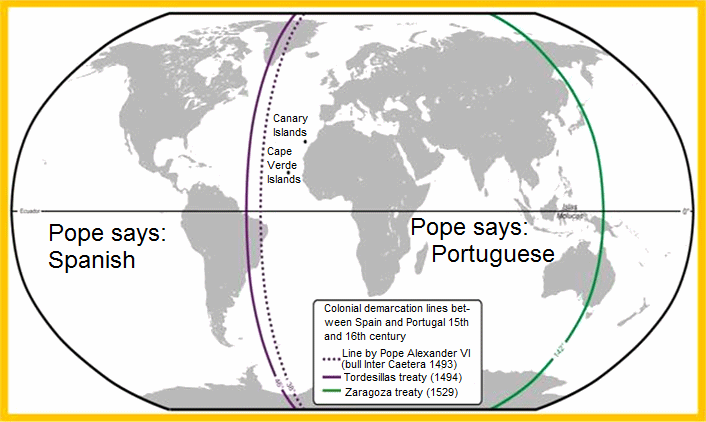
Which two countries were central in the slave trade and roughly how many Africans did they kidnap and enslave?
Portugal and England, 10-12 million
Where was there widespread practice of slave catching (i.e. finding fugitive slaves)?
It was only after many failed attempts that, in 1807, the slave trade in the British Empire was abolished. However, slaves in the colonies (excluding areas ruled by the East India Company) were not freed until 1838 – and only after slave-owners, rather than the slaves themselves, received compensation.
What did “reparations” mean in the immediate aftermath of slavery? What was the Slave Compensation Act?
this 1837 act compensated slave owners in the British colonies for the freeing of slaves
In A Midsummer Night’s Dream, what will happen to Hermia if she does not follow the wishes of her father?
she can be killed or forced to become a nun
In A Midsummer Night’s Dream, what happens in the woods?
Puck manipulates the four lovers with potions; the Mechanicals rehearse their play
What is Ninety-five Theses?
written by Luther; he was outraged at what he considered grave theological error (indulgences), posted on the door of a Wittenberg Church in 1517
What were letters of indulgence?
through certain actions (ex: repeated prayers, pilgrimage), individuals can receive full or partial remission of punishment for sins (ex: less time in purgatory)
What were some of the key ideas of protestantism?
emphasis on the Bible as the sole source of infallible truth (not religious leaders) and the doctrine of salvation by grace through faith alone (not indulgences)
What was the Jesuit order a reaction to?
opposed the Protestant Reformation; they took on vows of chastity and poverty; discontinued many medieval practices
Positive Elements of Utopia
no hunger, representative government, no lawyers, work and leisure balance, they hate war, benevolent slavery*, euthanasia*, freedom of religion*, universal healthcare, scornful of wealth/luxury
*questionable…
Negative Elements of Utopia
planned dislocation, open door policy, no privacy/surveillance state, moral management according to an algorithm of subtraction, marriage is controlled, slavery is universal, atheists cannot hold public office or positions of importance
Primitivism
sees history as a decline from a condition of excellence; belief that early cultures are superior to those of contemporary civilization
Hard vs Soft Primitivism
hard: assumes the worst of human nature; strong government keeps the brutish evil at bay
soft: law and human society corrupted primitive perfection and only by removing these can we reconstruct the perfect beginning; healthy, innocent, noble savage
Does Utopia reflect the period in which it was written, and how? What kinds of historical events does it reflect?
Utopia reflects the early 16th century by critiquing European inequality, political abuse, and economic injustice, especially in response monarchic abuses and religious tension
Thomas Hobbes
English philosopher, hard primitivism
Hans Holbein
German painter, portrait of Sir Thomas More and Allegory of the Old and New Testaments
Allegory of the Old and New Testaments
contrast between the unforgiving Old Testament Law on the left, and the forgiving Grace of the New Testament at the right.
left: fall of man, commandments given to Moses, death
right: salvation through Christ’s crucifixion and resurrection
OT Prophet Isaiah and NT Prophet John the Baptist
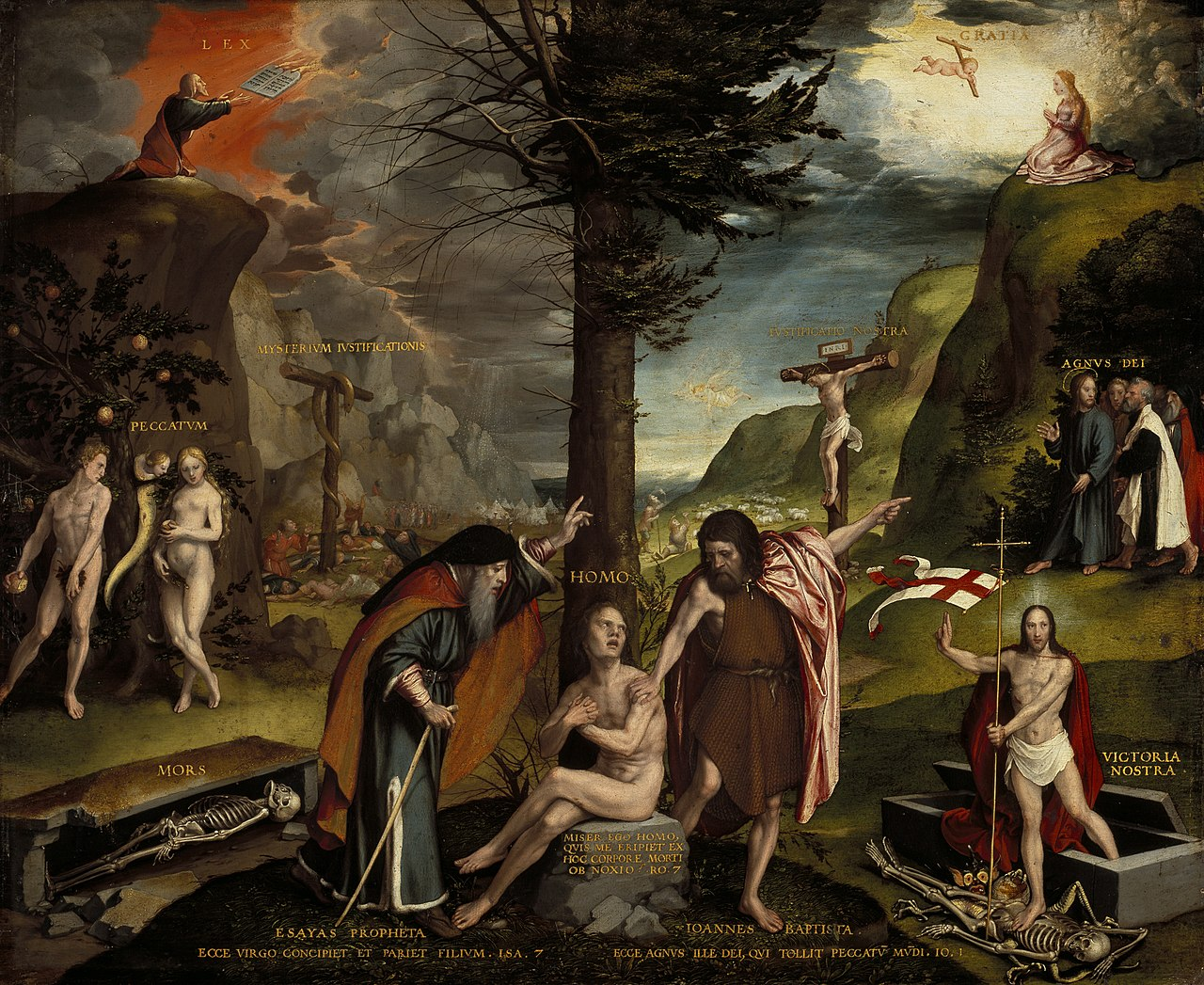
Henry VIII
king who ruled over the beginnings of the English Renaissance and the English Reformation.
St Ignatius of Loyola
founder of the Jesuit order, leader of the Counter-Reformation
Martin Luther
German theologian, leader of the 16th-century Protestant Reformation
Baldassare Castiglione
author of The Book of the Courtier
Isaac Newton
English physicist and mathematician who was the culminating figure of the Scientific Revolution of the 17th century
St Benedict
italian monk, one of the first people to standardize monastic life
Averroës
Muslim Spanish philosopher who integrated Islamic traditions with ancient Greek thought
William the Conqueror
French noble who was the leader of the Norman Conquest
Emperor Constantine
Roman emperor who initiated the evolution of the empire into a Christian state
Dante Alighieri
Italian poet, author of Divine Comedy and Inferno
Giovanni Boccaccio
Italian poet, author of the Decameron
Desiderius Erasmus
Dutch scholar of the northern Renaissance, the first editor of the New Testament
Da Vinci
Italian Renaissance artist; Last Supper (1495–98)
Lorenzi dei Medici
patron of arts and letters; ruled Florence for some 20 years in the 15th century, during which time he brought stability to the region; notably advanced the careers of Michelangelo and Leonardo da Vinci.
Avicenna
Persian philosopher and Muslim physician who wrote The Canon of Medicine
Martin Waldseemüller’s 1507 Map
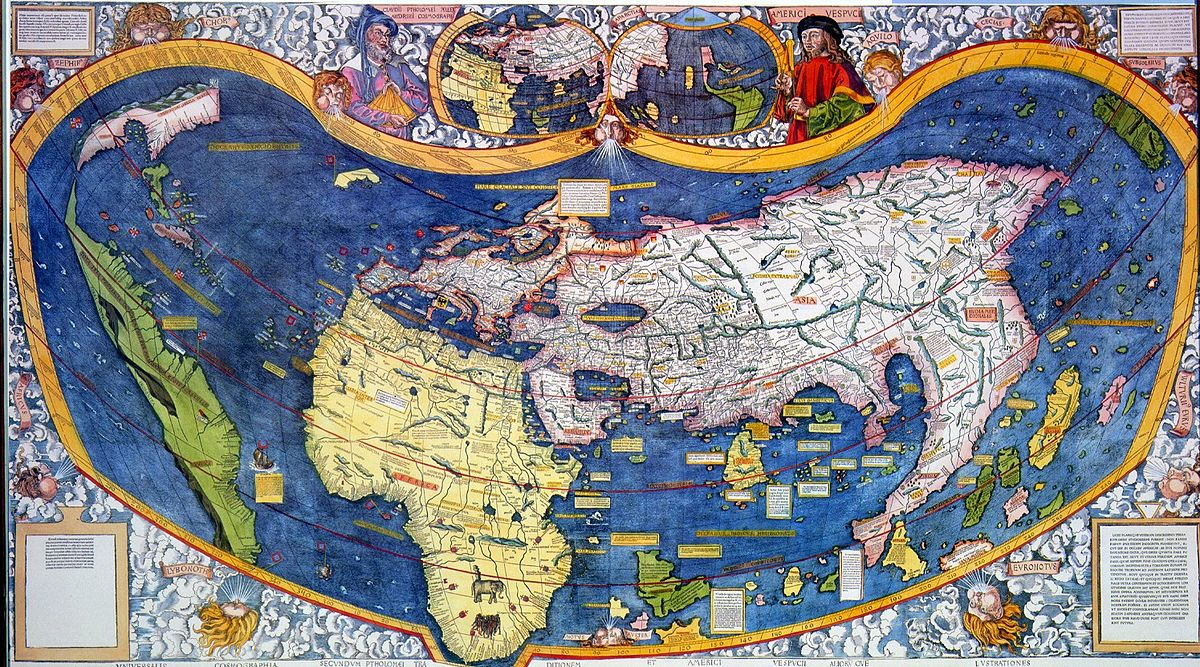
Raphael’s School of Athens
Plato points upwards: symbolizes his “ideal” philosophy, he did not believe Forms resided in the earthly realm but beyond it
Aristotle points down: symbolizes his “practical” philosophy, rejected Forms
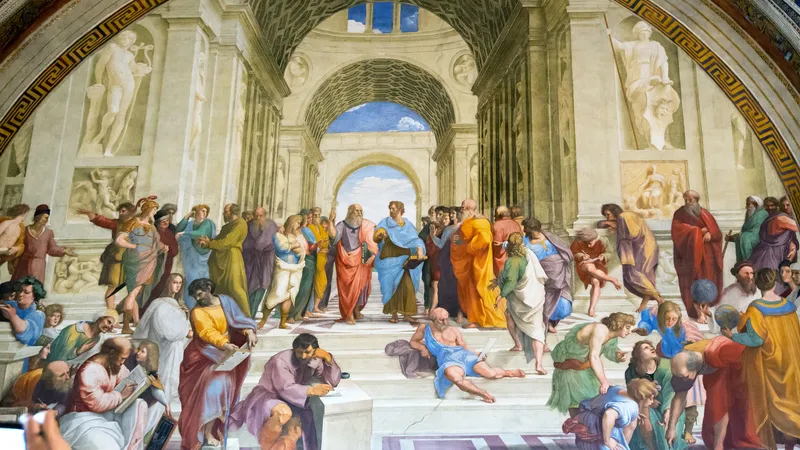
The Tree of Jesse
Jesse was the father of King David; painting follows the lineage to the birth of Jesus; it is the original use of the family tree as a schematic representation of a genealogy
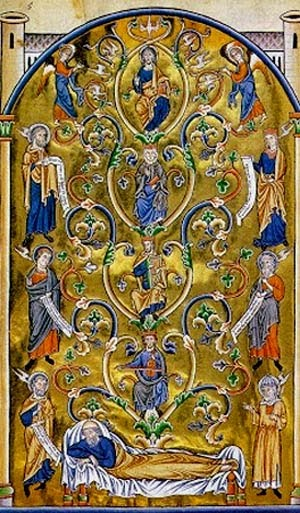
Antigone brought before Creon
